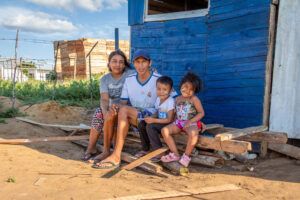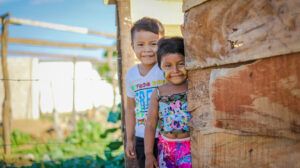 Stories
Stories
August 2, 2023 • 4 min read
Riohacha is a coastal city in northern Colombia known for its sweeping dunes and deep historical and cultural significance. It sits close to the Venezuelan border in a region that is home to the Wayuu people, whose language and cultural traditions remain strong. It’s a region that has been hard hit by the continuously spiralling socioeconomic, political and humanitarian crisis in Venezuela.
A struggle for survival, together
UN agencies estimate that seven million people have been driven from their homes. Two million have settled in Colombia, and Riohacha alone has absorbed nearly 50,000 refugees and migrants into a population of nearly 200,000. GOAL has been responding in the region since 2019.
Jasmelinda’s story reflects the larger realities of the crisis as well as her own strength and determination to overcome.
Her home was the small city of Los Puertos de Altagracia, Venezuela, across Lake Maracaibo from Colombia. She was independent and driven, working by day in a clothing store and studying at night. In time, she met and married her husband and had a child, which interrupted her plans, but she smiles as she relates that their union was a true partnership: “In my house, I would do anything to help my husband, who worked in construction or any work that came his way — we always helped each other.”
“Living there was trying, as we had to scrape together the bare necessities every day.” As she recalls that time, her smile fades as she describes long journeys into the surrounding villages, selling fish, clothes, pudding (a favoured Venezuelan dessert), or whatever they could to put food on the table.
It was difficult for Jasmelinda, as she faced the reality that her contributions to their domestic partnership were not adequate, and though her husband worked hard, opportunities were vanishing as Venezuela plunged deeper into crisis. “We had to go out and look for money and save up so that we could buy what was necessary for our son.”

Jasmelinda, her husband, and two of their children at their home in Riohacha
Journey of hope
The difficult situation set the couple, for a time, on separate paths: her husband went looking for work in Valencia, a large industrial city about 500 kilometres away, while Jasmelinda, now pregnant, stayed behind. For several months, they were able to sustain themselves, thanks to income earned by his mother selling backpacks and hammocks woven in the Wayuu tradition. Rumours of job opportunities just next door in Colombia grew louder by the day, driving them toward a life-changing decision. Jasmelinda remembers finally saying out loud the words that had been until then only running through her head: “Let’s go to Colombia to see if we can find a job that gives us more to support my pregnancy.”
Their dire situation and the powerlessness of not being able to feed their children drove the decision. “We decided to make the trip. My husband left first, and he had to look for a place to live and arrange things so that we could follow.” The decision soon began to pay off. Her husband found a job, so she gathered up her little ones and set out on her route. She first settled and worked in Riohacha until she could raise enough funds to travel to the larger city of Barranquilla to reunite with her husband.
For months, she worked selling gasoline while carrying her three-month-old baby, trying her hardest to earn enough money to buy tickets to Barranquilla. However, her little girl’s health deteriorated, derailing Jasmelinda’s plans. She decided to remain in Riohacha, where she and her little one receive assistance from GOAL.

Jasmelinda’s happy and healthy children playing outside their home in Riohacha
Weaving a new life
“Migrating here for me, it’s been quite a struggle to find consistent work and sustenance,” she tells us. “I thank God for providing all the help they have in turn given us in Colombia: education, care and medicine.”
She now has three children, ages 8, 6, and 4. They are her motivation and the reason she made the decision to travel such a distance and build a new story with her husband. “I can only thank God,” she reiterates.
Today, she is part Artesanías para el Rescate (Artisans to the Rescue), an initiative of GOAL Colombia’s comprehensive Barrio Resiliente (Resilient Neighborhood) programme. She has improved her traditional Wayuu weaving skills and has been earning an income selling her handiwork – Wayuu bags and backpacks are a staple of life in the region and one of its most popular souvenirs for tourists.
Undoubtedly, her journey has taught Jasmelinda that where there’s a will, there’s a way. In this case, her relentless force of will allowed her to seize the opportunity presented to her by the Barrio Resiliente, “Building Resilient Cities through Resilient Neighbourhoods,” project. The project aims to mitigate the risks of rapid, unplanned urban expansion by increasing the resilience of vulnerable refugees and host communities through a variety of economic recovery activities while also promoting the social and economic inclusion of Venezuelan migrants. GOAL is implementing Barrio Resiliente with the support of USAID and its strategic partner, Tierra de Hombres.
Jasmelinda’s parting words: “I hope that GOAL offers us a space to continue working and fighting for our dreams.”
You can support GOAL’s work with families like Jasmelinda’s with a donation today.
